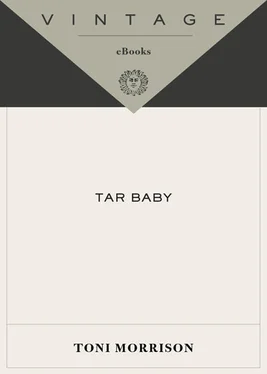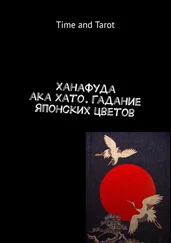Toni Morrison - Tar Baby
Здесь есть возможность читать онлайн «Toni Morrison - Tar Baby» весь текст электронной книги совершенно бесплатно (целиком полную версию без сокращений). В некоторых случаях можно слушать аудио, скачать через торрент в формате fb2 и присутствует краткое содержание. Жанр: Старинная литература, на русском языке. Описание произведения, (предисловие) а так же отзывы посетителей доступны на портале библиотеки ЛибКат.
- Название:Tar Baby
- Автор:
- Жанр:
- Год:неизвестен
- ISBN:нет данных
- Рейтинг книги:3 / 5. Голосов: 1
-
Избранное:Добавить в избранное
- Отзывы:
-
Ваша оценка:
- 60
- 1
- 2
- 3
- 4
- 5
Tar Baby: краткое содержание, описание и аннотация
Предлагаем к чтению аннотацию, описание, краткое содержание или предисловие (зависит от того, что написал сам автор книги «Tar Baby»). Если вы не нашли необходимую информацию о книге — напишите в комментариях, мы постараемся отыскать её.
Tar Baby — читать онлайн бесплатно полную книгу (весь текст) целиком
Ниже представлен текст книги, разбитый по страницам. Система сохранения места последней прочитанной страницы, позволяет с удобством читать онлайн бесплатно книгу «Tar Baby», без необходимости каждый раз заново искать на чём Вы остановились. Поставьте закладку, и сможете в любой момент перейти на страницу, на которой закончили чтение.
Интервал:
Закладка:
“He was going to send me a wig, he said.”
“Looks like he did,” said Jadine.
“Not this one. I have a picture of the other one. It’s at home. Is he coming back? Can you get it for me?”
“No,” Jadine answered.
“You kill him?” asked the girl in a very matter-of-fact tone.
Jadine slung the huge, lightweight traveling bag over her shoulder and removed her coat from the top of the stall where it hung. “I have to go now,” she said.
“Thérèse said you kill him,” the girl insisted.
“Tell Thérèse she killed him.”
“No,” said the girl, perplexed. “Thérèse has magic breasts. They still give milk.”
“I bet they do,” said Jadine.
“But there is nobody to nurse them.”
“She’s not looking in the right places,” said Jadine. Black pearls of hair were visible at the wig’s edge. The girl’s eyes were wide, still, the curiosity in them was the only thing that kept them from looking like an animal’s. A deer, thought Jadine. She has the eyes of a curious deer. She wished once more that she had had real talent—she’d like to draw her—deer eyes, wig and all. Suddenly she reached into the side pocket of her traveling bag. A few francs were shoved in there and she dropped the whole lot into the girl’s plastic pail. “Bye, Mary, I have to go. Good luck.” Jadine pushed open the door and was gone.
“Alma,” whispered the girl. “Alma Estée.”
ABOARD the 707 Jadine had free use of the seat next to her. Not many passengers in first class. She checked her five luggage claim tickets stapled to the envelope that held a copy of her one-way ticket to Orly. Everything was in order. As soon as the plane was airborne, she reached above her head to adjust the air flow. Bringing her hand down she noticed a tiny irregularity in the nail of her forefinger. She opened her purse and took out an emery board. Two swift strokes and it was gone. Her nail was perfect again. She turned her sealskin coat lining side out and folded it carefully into the empty seat beside her. Then she adjusted the headrest. The same sixteen answers to the question What went wrong? kicked like a chorus line. Having sixteen answers meant having none. So none it was. Zero. She would go back to Paris and begin at Go. Let loose the dogs, tangle with the woman in yellow—with her and with all the night women who had looked at her. No more shoulders and limitless chests. No more dreams of safety. No more. Perhaps that was the thing—the thing Ondine was saying. A grown woman did not need safety or its dreams. She was the safety she longed for.
The plane lifted itself gracefully over the island; its tail of smoke widened, then dispersed. It was evening and the stars were already brilliant. The hills below crouched on all fours under the weight of the rain forest where liana grew and soldier ants marched in formation. Straight ahead they marched, shamelessly single-minded, for soldier ants have no time for dreaming. Almost all of them are women and there is so much to do—the work is literally endless. So many to be born and fed, then found and buried. There is no time for dreaming. The life of their world requires organization so tight and sacrifice so complete there is little need for males and they are seldom produced. When they are needed, it is deliberately done by the queen who surmises, by some four-million-year-old magic she is heiress to, that it is time. So she urges a sperm from the private womb where they were placed when she had her one, first and last copulation. Once in life, this little Amazon trembled in the air waiting for a male to mount her. And when he did, when he joined a cloud of others one evening just before a summer storm, joined colonies from all over the world gathered for the marriage flight, he knew at last what his wings were for. Frenzied, he flies into the humming cloud to fight gravity and time in order to do, just once, the single thing he was born for. Then he drops dead, having emptied his sperm into his lady-love. Sperm which she keeps in a special place to use at her own discretion when there is need for another dark and singing cloud of ant folk mating in the air. Once the lady has collected the sperm, she too falls to the ground, but unless she breaks her back or neck or is eaten by one of a thousand things, she staggers to her legs and looks for a stone to rub on, cracking and shredding the wings she will never need again. Then she begins her journey searching for a suitable place to build her kingdom. She crawls into the hollow of a tree, examines its walls and corners. She seals herself off from all society and eats her own wing muscles until she bears her eggs. When the first larvae appear, there is nothing to feed them so she gives them their unhatched sisters until they are old enough and strong enough to hunt and bring their prey back to the kingdom. That is all. Bearing, hunting, eating, fighting, burying. No time for dreaming, although sometimes, late in life, somewhere between the thirtieth and fortieth generation she might get wind of a summer storm one day. The scent of it will invade her palace and she will recall the rush of wind on her belly—the stretch of fresh wings, the blinding anticipation and herself, there, airborne, suspended, open, trusting, frightened, determined, vulnerable—girlish, even, for an entire second and then another and another. She may lift her head then, and point her wands toward the place where the summer storm is entering her palace and in the weariness that ruling queens alone know, she may wonder whether his death was sudden. Or did he languish? And if so, if there was a bit of time left, did he think how mean the world was, or did he fill that space of time thinking of her? But soldier ants do not have time for dreaming. They are women and have much to do. Still it would be hard. So very hard to forget the man who fucked like a star.
THE MAN sat on the stone wall that separated Rue Madelaine from the sea. His legs hung over the ledge below which were rocks and a thin strip of dirty sand. To the left a rickety pier extended some two hundred feet into the water where black boys leaped, splashed, screamed and climbed back up to leap again. The garbage on the sand was mostly paper and bottles. No food garbage down here. Here, away from the tourist shops, away from the restaurants and offices, was that part of the boulevard where the sea threw up what it could not digest. Whatever life there is on the sand is desperate. A gull negotiated the breeze and swooped down on a black starfish. The gull pecked it, flew away and returned to peck again and again until finally the starfish yielded the magenta string that was its heart. The man watched the gull tear it out with a great deal of interest. Then he swung his legs over the wall and stood up. Shielding his eyes from the sun with his arm, he looked toward the market crowd: a half-block of cloth roofs, tables, baskets, pots, boxes and trays. His jacket was draped across his forearm—both hands in his pockets—as he started toward the market looking for Thérèse. Earlier he had taken the shuttle bus from the airport to the Old Queen Hotel and gone directly from there up the hill to the powder pink house, climbing slowly, carefully, keeping to the edge of the road where the dust gave way to grass. He moved like a man saving his strength, or one suspicious of trip mines.
No one was in the pink house. The door was latched although the windows were open; a print skirt ripped down the back seam hung from one of the front windows and served it as both curtain and shade. He poked his head through and tossed a piece of hand luggage into the room. Then he walked back down the hill, nodding to a few passersby, and stopped at the house that sold meat pies and rum and sometimes lent hair clippers. He didn’t even try the little tin-can French he’d learned in Vietnam, he simply said Gideon? Thérèse? The owner and another man told him something he could not understand about Thérése, and mentioned Gideon’s name in connection with “taxi.” He nodded and smiled as though it was all brilliantly clear and continued down the hill. The morning he spent walking the streets, looking at the elegant houses turned into restaurants or offices, and the colonial administration buildings built like castles to last. Away from the town to the north and east were the frightened houses of the whites, hiding on sloped roads behind hedges of tropical flora. South was the business district collected mainly on Rue Madelaine and the tributaries running from it. The Blacks lived in the western hills in shacks and cement-block houses or along narrow streets on the west side of town where the sea spit up what it could not digest. It was unusually cool and his weather eye saw that a rainstorm might be due announcing the hurricane season. He walked the streets of Queen of France, glancing at the drivers of the taxis in case Gideon might be one. Three hours of walking and he was not tired. Had not been tired for days now. Being still was the problem. In the apartment in New York he could not sit for long—except to look again and again at the photographs she had taken in Eloe. A fat yellow envelope of pictures had lain unopened on the coffee table along with the keys. Having nothing quiet to do with his huge hands except finger his original dime, he opened the envelope and looked at the pictures of all the places and people he had loved. Then he could be still. Gazing at the photos one by one trying to find in them what it was that used to comfort him so, used to reside with him, in him like royalty in his veins. Used to people his dreams, and anchor his floating days. When danger was most imminent and he fell asleep in spite of himself they were there—the yellow houses with white doors, the ladies at the pie table at Good Shepherd—Aunt Rosa; Soldier’s mother May Downing whom they called Mama May; Drake’s grandmother Winnie Boon who switched them every spring; Miss Tyler who had taught him how to play piano, and the younger women: Beatrice, Ellen, and the children who had been born while he was away. The men: Old Man, Rascal, Turner and Soldier and Drake and Ernie Paul who left the service a first lieutenant and now had his own mortuary in Montgomery, Alabama, and doin fine. There were no photos of them, but they were there in the pictures of trees behind their houses, the fields where they worked, the river they fished, the church where they testified, the joints where they drank. It all looked miserable in the photographs, sad, poor and even poor-spirited.
Читать дальшеИнтервал:
Закладка:
Похожие книги на «Tar Baby»
Представляем Вашему вниманию похожие книги на «Tar Baby» списком для выбора. Мы отобрали схожую по названию и смыслу литературу в надежде предоставить читателям больше вариантов отыскать новые, интересные, ещё непрочитанные произведения.
Обсуждение, отзывы о книге «Tar Baby» и просто собственные мнения читателей. Оставьте ваши комментарии, напишите, что Вы думаете о произведении, его смысле или главных героях. Укажите что конкретно понравилось, а что нет, и почему Вы так считаете.











